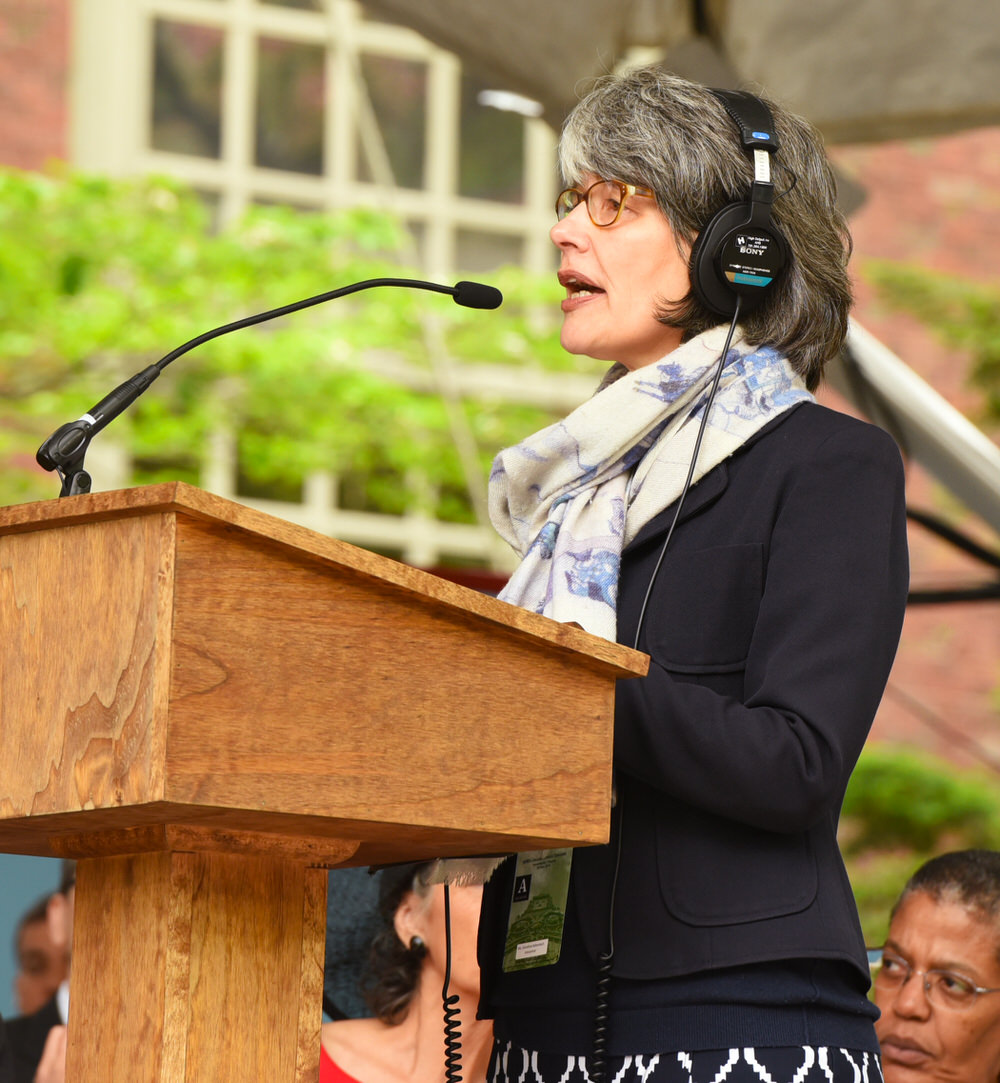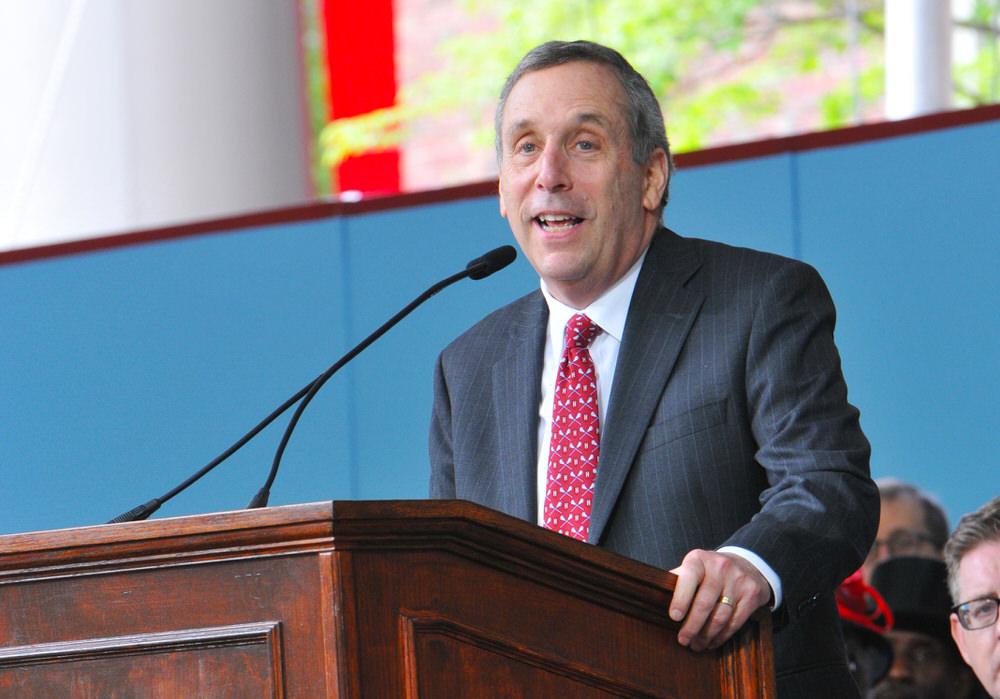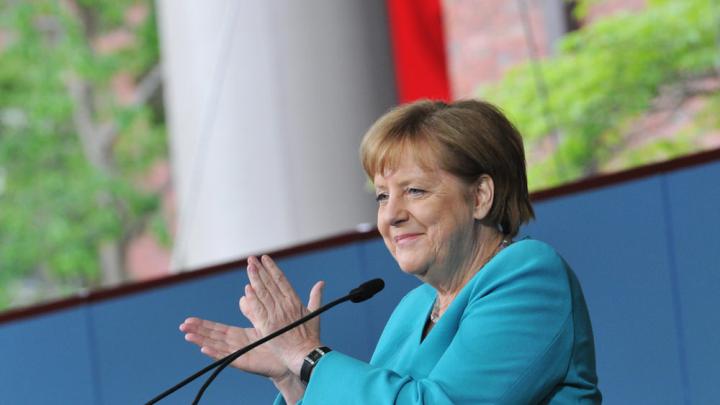Before she launched into the main part of her Commencement address—about the present, the future, and the frightening world that the class of 2019 now inherits—German chancellor Angela Merkel recalled her life in East Germany under Soviet rule. Speaking primarily in German (save for a short introduction and conclusion bookending her address), with an interpreter translating sentence by sentence, she told a huge crowd in Tercentenary Theatre a story that would set the tone for the rest of her comments, inviting the crowd to think about imagination, and the possibility of swift, previously unimaginable change, throughout the afternoon. “I grew up in East Germany, in the GDR—the part of my country which was not free....People were oppressed and under state surveillance. Political dissidents were persecuted. The East German government was afraid that people would flee to freedom. And that’s why it built the Berlin Wall, a wall made of concrete and steel. Anyone caught trying to overcome it was arrested or shot dead. This wall, which cut Berlin in half, divided a people and divided families.

Angela Merkel's interpreter, Dorothee Kaltenbach
Photograph by Jim Harrison
“My first job after college was as a physicist at the Academy of Sciences in East Berlin,” she continued. “I lived near the Berlin Wall. I walked towards it every day on my way home from my institute. Behind it lay West Berlin, freedom. And every day when I was very close to the wall, I had to turn away at the last minute to head toward my apartment. Every day I had to turn away from freedom at the last minute....The Berlin Wall limited my opportunities; it quite literally stood in my way. However, there was one thing this wall couldn’t do during all of those years. It couldn’t impose limits on my inner thoughts. My personality, my imagination, my dreams and desires—prohibitions or coercion couldn’t limit any of that. Then came 1989. A common desire for freedom unleashed incredible forces throughout Europe. In Poland, in Hungary, in Czechoslovakia, as well as East Germany, hundreds of thousands of people dared to take to the streets. The people demonstrated and brought down the wall. Something which many people, including myself, wouldn’t have believed possible, became reality.”
And so, she concluded, “During these months 30 years ago, I experienced firsthand that nothing has to stay the way it is. This experience, dear graduates, is the first thought I want to share with you today....Anything that seems to be set in stone or inalterable can, indeed, change.” Her audience was stirred by these words; she continued: “My parents’ generation discovered this in a most painful way. My father and my mother were born in 1926 and 1928. When they were as old as most of you here today, the betrayal of all civilized values that was the Shoah and World War II had just ended. My country, Germany, had brought unimaginable suffering on Europe and the world. The victors and the defeated could easily have remained irreconcilable for many years. But instead, Europe overcame centuries-old conflicts. A peaceful order based on common values, rather than supposed national strength, emerged….And the relationship between Germans and Americans, too, demonstrates how former wartime enemies can become friends. It was George Marshall who gave a crucial contribution to this through the plan he announced at the Commencement ceremonies in 1947 in this very place.”
Merkel, who has been chancellor of Germany since 2005 and will step down at the end of her term in 2021, left her career as a scientist and entered politics at 35, after the unification of Germany. She used the rest of her wide-ranging speech to address graduates about confronting the world they face, touching on some of the same themes as College Class Day speaker Al Gore and Kennedy School Class Day speaker Juan Manuel Santos, such as climate change and the increasingly evident reality that “smart” devices have become tools for surveilling and influencing behavior. She did so with a sense of history, with her characteristic attention to compromise and building consensus, and with a conviction that connecting with other people across difference is not only possible, but generative and essential.
“Climate change poses a threat to our planet’s natural resources; it and the resulting crises are caused by humans,” Merkel said. “I will therefore do everything in my power to ensure that Germany, my country, will achieve climate neutrality by 2050”—a pledge that elicited strong applause. But: “Changes for the better are possible if we tackle them together....The second thought I want to share with you is, therefore, more than ever, our way of thinking and our actions have to be multilateral rather than unilateral. Global rather than national. Outward-looking rather than isolationist.” She offered not so much a plan, like the one Europe needed in 1947, but a stern critique of contemporary political discourse, within the United States and within many nations in Europe, and, of late, between them.
“You, dear graduates, will have quite different opportunities to do this in the future than my generation did—after all, your smartphones probably have considerably more processing power than the copy of an IBM mainframe computer manufactured in the Soviet Union that I was allowed to use for my dissertation in 1986,” she joked. Technology might seem to offer limitless possibilities, but, she asked, “Are we laying down the rules for technology, or is technology dictating how we interact? Do we prioritize people as individuals with human dignity and all their many facets? Or do we see in them merely consumers, data sources, objects of surveillance? These are difficult questions. I have learned that we can find good answers even to difficult questions if we always try to view the world through the eyes of others. If we respect other people’s history, traditions, religion, and identity. If we hold fast to our inalienable values, and act in accordance with them.
“And if we don’t always act on our first impulses, even when there is pressure to make a snap decision—but instead take a moment to stop, be still, think, pause,” she added. (The audience seemed amused at this comment—perhaps displaying a cultural difference.)
“Let us surprise ourselves by showing what is possible,” she said, echoing what she told the German parliament after she was first elected chancellor. “Let us surprise ourselves by showing what we are capable of. In my own life, it was the fall of the Berlin Wall that allowed me almost 30 years ago to step out into the open....That was an exciting and magical time, just as your lives will be exciting and magical. But I also experienced moments of doubt and worry. For at that time, we all knew what lay behind, but not what might lie ahead. Perhaps that reflects a little how you, too, are feeling today, amidst all the joy of this occasion.”
The final thought she wanted to leave with the graduates, she said, was that “The moment when you step out into the open is also a moment of risk-taking. Letting go of the old is part of a new beginning….I believe that time and time again, we need to be prepared to keep bringing things to an end in order to feel the magic of new beginnings and make the most of opportunities. That’s what I learned as a student, a scientist, and what I experience now in politics.” The reflection on beginnings recalled her quotation, at the very start of the speech, from German writer Herman Hesse: “In all beginnings dwells a magic force for guarding us and helping us to live.”
“That’s why I want to leave this wish with you,” Merkel concluded. “Tear down walls of ignorance and narrow-mindedness, for nothing has to stay as it is.”
The President’s Speech: “I Am an Optimist”
After he became president of Harvard last July, one of Lawrence S. Bacow’s earliest interactions with students came in the fall, when he and his wife, Adele Fleet Bacow, pitched in to help with move-in day, in 95-degree heat. Photos show Bacow smiling broadly, wearing a T-shirt that read, “Move-In Staff.”
Today, in considerably cooler weather, he delivered his first Commencement address as president, at the afternoon annual meeting of the Harvard Alumni Association, just before Merkel’s speech. Bacow spoke of hope—and of the need for it. “During my brief time in office, our world has reminded us daily of the necessity and the urgency of our work,” he began, noting a few of the troubles that worry him: coarsened public discourse, volatile national and international politics, gun violence, deadly attacks against worshippers at synagogues and mosques and churches around the world, the existential threat of climate change.
Some troubles have touched Harvard more directly than others. “We have grown increasingly aware of the scourge of sexual harassment and sexual assault, and have struggled to consider how institutions, Harvard among them, can prevent and address behavior that threatens individuals and weakens communities.”

Lawrence S. Bacow
Photograph by Jim Harrison
In face of these challenges, then Bacow turned to the sources of optimism. He’d found it, he said, in the students, graduates, and faculty whose work—in public service, in business, teaching, politics, research, technology, and the arts—he has traveled the country and the globe, and the campus, to learn about during the past year. These “Harvard citizens,” who “are making the world better in more ways than we could imagine,” he said, are “the power of this institution—not its brand, not our buildings, not our pomp and circumstance (as wonderful and terrific as that is). This University, Harvard, is its people—their aspirations, their achievements—their diversity of background, experience and thought—their desire to see beyond themselves and their devotion to serving others.”
So, he concluded: “Yes, I am an optimist. I’m an optimist because I live and work among all of you–because I see what you do and because I know the boundless potential of what you can do. May we look to one another for inspiration in the years to come. May the expectations placed on us be exceeded only by our ability to meet them. And may Harvard continue to be a wellspring of hope for the world. It’s an honor to serve you as your president.”








